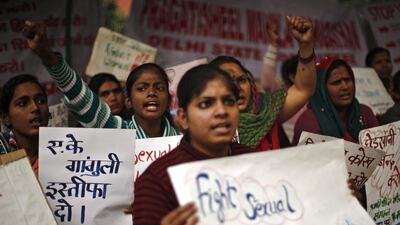NEW DELHI // The fatal gang rape of a student on a bus in New Delhi shattered India’s silence over sexual violence and emboldened victims to speak out, family members and campaigners said yesterday on the anniversary of the attack.
The victim’s father, who cannot be named for legal reasons, said the assault on his 23-year-old daughter on a moving bus on December 16 last year “shook not just us but the entire country and the world”.
“We will only say that this date should be celebrated... so that people keep getting inspired and keep joining this movement, coming together to ensure the safety of women,” the father said.
The physiotherapy student suffered a savage sexual assault at the hands of six men, including with an iron rod, after she boarded a private bus while going home from the cinema with a male friend.
She died from her injuries 13 days later.
The brutality of the attack, and her determination to survive so she could report her attackers to police, sparked large-scale and sometimes violent protests as well as soul-searching about India’s treatment of women.
The case led to reform of rape and sexual assault laws and shone an international spotlight on what Indian women’s groups called a “rape epidemic” in the country.
While police expect annual figures to show a rise in the number of reported rapes, campaigners say the increase is in fact a welcome indicator of changing attitudes.
Divya Iyer, a researcher for Amnesty International, agreed that more women were coming forward to report attacks -- but said it was a trend largely confined to towns and cities.
“Women have been empowered to speak out since the case and there are more crimes being reported. But you have to look at who are these women, where is this happening?” Ms Iyer said.
“It is mainly middle-class women. It is not across the board.... in rural areas in particular, access to justice is a problem.
“Not only is there social stigma, but there is no guarantee that their complaint of rape will be taken seriously by police, let alone result in a conviction,” she said
* Agence France-Presse

